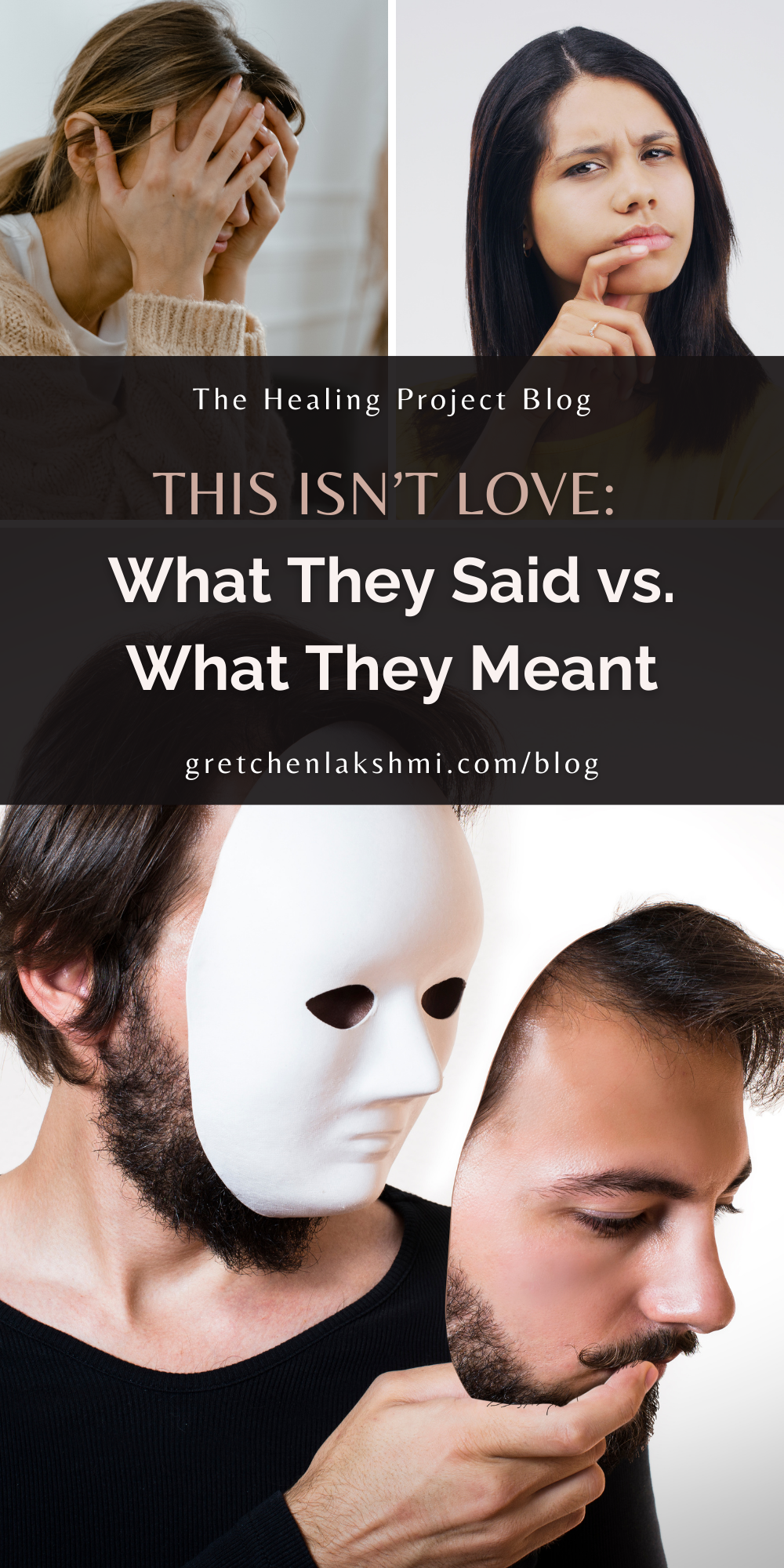This Isn’t Love: What They Said vs. What They Meant
What They Said Sounded Like Love—But It Wasn’t
They said they loved you.
But love shouldn't feel like walking on eggshells.
It shouldn't come with fear, or guilt, or shame.
It shouldn't silence you.
It shouldn't hollow you out.
Plenty of survivors of emotional and psychological abuse have questioned their own experiences because the words they heard were so close to what love is supposed to sound like. But the meaning—the impact—was completely different.
This week,
we’re translating the coded language of abuse.
We’re flipping the script.
We’re saying the quiet part out loud.

What They Said vs. What They Meant
Below is a list of phrases that abusers often use—and what they really mean when those words are said to control rather than connect. See if any of these feel familiar to you:
🗣
“I’m only doing this because I love you.”
➡️ “I’m crossing your boundaries and I’m going to use love as a weapon to justify it.”
🗣
“You’re too sensitive.”
➡️ “I’m going to keep hurting you and make you feel ashamed for reacting to it.”
🗣
“No one else will ever love you like I do.”
➡️ “I’ve chipped away at your self-worth so you won’t leave me.”
🗣
“Why are you making such a big deal out of this?”
➡️ “I need you to shut down your emotions so I don’t have to take responsibility.”
🗣
“You’re imagining things.”
➡️ “If I can make you doubt your reality, I get to keep mine intact.”

🗣
“I’m sorry you feel that way.”
➡️ “I’m not actually sorry for what I did—I just want you to stop confronting me.”
🗣
“You used to be so much fun before you got so emotional all the time.”
➡️ “I preferred you when you stayed silent about your pain.”
🗣
“You’re the one with problems, not me.”
➡️ “I won’t take accountability. I’ll project all my dysfunction onto you.”
🗣
“I know I messed up, but I’m working on it. You just have to be patient.”
➡️ “I want to keep you waiting indefinitely while I continue the same behavior.”
🗣
“If you really loved me, you’d forgive me.”
➡️ “I expect love to mean unconditional tolerance for abuse.”
🗣
“You’ve changed.”
➡️ “You’ve started noticing my patterns, and that’s a threat to my control.”

But It Felt Like Love at First… Didn’t It?
This is one of the most painful pieces of abuse to reckon with: in the beginning, it often does feel like love. Because abusers wear masks. They mirror your values. They shower you with praise, affection, and attention in a process called love bombing—a strategic flood of affection designed to hook you emotionally.
But love bombing isn’t intimacy—it’s entrapment. It’s not about seeing you—it’s about securing your compliance.
When their behavior shifts (and it always does), you’re left confused, chasing the version of them that once made you feel special. But that version was always a performance.

What Real Love Sounds Like
For those who have never experienced it or have a difficult time discerning the difference, here’s what actual, respectful love sounds like in action:
💬 “I hear you. Your feelings matter.”
💬 “I’m sorry. I want to understand how I hurt you and do better.”
💬 “You don’t have to explain why you need space. I respect your boundaries.”
💬 “I want us both to grow—even if that means making changes.”
💬 “You are not responsible for managing my emotions.”
💬 “I love who you are—not who I want you to be.”
💬 “I’ll sit with you through this, even when it’s hard.”
Real love holds space, not power.
It expands your world—it doesn’t shrink it.
It never needs to convince you that it’s love.
You’ll feel it in your nervous system when you’re safe.

To Anyone Just Realizing the Difference...
If you’re reading this and recognizing your own relationship between the lines—you are not alone. You’re not overreacting. You’re not imagining things. You’re starting to see clearly.
And that clarity is the beginning of freedom.
May you continue to find the truth beneath the words.
And may you come to know a kind of love that never makes you question your own worth again.
Warmly,
Gretchen
SOMATIC TRAUMA SPECIALIST + ENERGETIC INTUITIVE
SHARE ON PINTEREST








